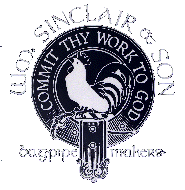Getting Started on the Pipes or Drums
![]()
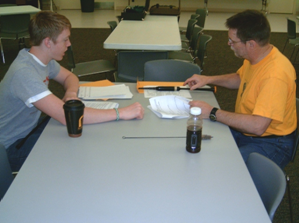
The Omaha Pipes and Drums is a registered non-profit 501.C3 teaching organization providing FREE highland bagpipe and drumming lessons. We meet most Saturday mornings at St. Andrew’s Episcopal Church (84th & Pacific) with student lessons beginning at 8:00 am. All ages and abilities are welcome! No previous musical experience is necessary…but it helps.
If you have ever wanted to learn to play the great highland bagpipes or drums, talk to us, or better yet, stop by during a practice.
For Beginning Pipers…
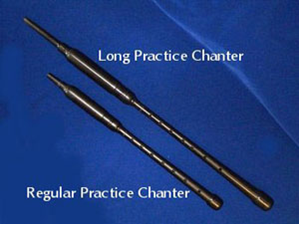
Before you go out and buy something you don’t need, talk to us. For pipers, you don’t start out on the bagpipes…you begin on a practice chanter. A practice chanter is used by beginning students and advanced players alike. Practice chanters are used by beginners to learn techniques for fingering and blowing. Because pipers need to know their tunes by heart, practice chanters are also used when learning any new tune. Pipe band members practice together using practice chanters, both for practicing old tunes and for learning the tempo and notes to new music. Whether just beginning or an old pro, the practice chanter is essential in the musical progression on the bagpipes. For older kids and adults, a long practice chanter is generally recommended, because the finger hole spacing is more similar to that of on the pipe chanter on the bagpipes. Practice chanters are available in Polypenco plastic or African blackwood. There are advantages and disadvantages to both materials. Polypenco plastic is very durable and easy to clean, as well as considerably less expensive. Some folks feel that blackwood practice chanters, in addition to being nicer looking, sound better, but to others, the difference is barely discernable. We will provide you with a tutor book.
For Drummers…
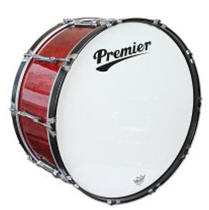
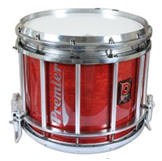
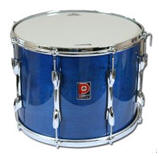
Again, before you go out and buy something you don’t need, talk to us.
Highland drumming is significantly different than marching band or drum corps. Again, talk to us before making a purchase. Highland Drumming, also called Scottish Drumming or Pipe Band Drumming is also taught by the Omaha Pipes and Drums for FREE on Saturday mornings. Like the piping classes, students are offered instruction during the first part of the morning, followed by “band practice” in which the students can participate during the tunes that they have successfully learned. Highland Drumming is a style of percussion accompaniment that is significantly different than most other forms of percussion performance. The most outstanding differences are that the percussion section does not set up a rhythm…… or “lay down a groove” ….. for the other musicians to follow, and the drum corps (as it is often called) is the only source of dynamics in the band. The drum scores are written to closely follow the rhythms and the “feel” of the tunes, with a primary goal of enhancing the music by reinforcing the pipers’ playing. More so than other styles of music, the drum scores are “harmony” to the music, and not simply a repetitive beat that goes on while the band plays. While the drums and the pipes together play out the intricacies of the tunes, the drum corps contributes the dynamics, or the “light and shade” to the performance. While the pipes have no ability to adjust the volume level of their instruments, the drum corps alone provides the illusion of soft and loud passages, through exaggerated dynamics in the percussion scores. These prime differences, along with many other execution differences from other percussion styles add up to what is often considered among the more difficult marching percussion styles to successfully perform. The stick control, hand speed and extremely tight unison playing that is required for Highland Drumming puts this type of percussion into the category of “advanced performance style.” This is not to say that individuals cannot begin their drumming career with Highland Drumming, it certainly can be, and has been accomplished. In fact for a serious and dedicated percussion student, this is an excellent venue in which to work. Because of the critical nature of the unison accuracy, the relative difficulty of the drum scores, and the fact that the percussion parts are based upon the generally accepted rudimental standards, a student has an opportunity to attain a level of performance that will be of very significant value when the skills developed by Highland Drumming are applied to other styles of performance. A pipe band drum corps generally consists of one bass drummer, multiple side drummers (snares), and a mid-section composed of tenor drum player(s). The single bass drummer, as it is well accepted in any style of marching band, is the most key player in the drum corps. In pipe band style, the bass player must have an intimate feel for the tunes, and must be rock steady in maintaining a tempo. The side drummers play “pipe band snare drums.” These instruments are high tension marching snare drums, with Kevlar top heads, and with two snare strainer assemblies, one under the top head and one under the bottom head. High pitched, crisp sound…….and heavy. The side drums are played with lightweight sticks, for speed and a bright crisp tone. The tenor drummers each carry a single tenor drum. There are two styles of play for tenor drummers, known as rhythm tenors and flourish tenors. The rhythm tenors play designated scores to augment the overall sound of the drum corps. The flourish tenors are the “show” drummers of the corps, well known for their routines of swinging and spinning their drumsticks while the other drummers play. While some bands have tenors of each type, it is common to see tenor drummers who combine the skills, and play some rhythms as well as flourish. The Omaha Pipes and Drums provides basic percussion instruction to beginners, as well as a promise to challenge experienced percussionist.
Frequently asked piping questions:
Bagpipe Manufacturers
Check our “LINKS” page for a list of suppliers for these and other quality bagpipes and supplies.
Frequenty asked drumming questions:
Drumming Manufacturers
Check our “LINKS” page for a list of suppliers for these and other quality drums and supplies.




